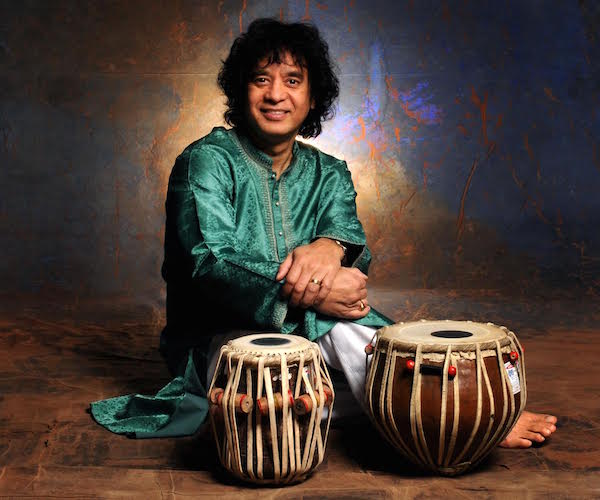Music Preview: Tabla Superstar Zakir Hussain — Do Not Fear a Sonic Culture Clash
Masters of Percussion is a biannual tour that Zakir Hussain orchestrates with an evolving and revolving cast of musicians who come from diverse backgrounds and traditions.

Indian percussion icon Zakir Hussain — “People who come to his concert should be open to surprises.” Photo: Jim Maguire.
By Scott McLennan
When tabla master Zakir Hussain hangs out with his fellow musical collaborators back stage before a concert, the chatter almost never touches on the music they are playing. “They’ll ask, ‘How’s your son? How’s your daughter? How’s the food here?’ And then we take that conversation to the stage and keep it going through our instruments,” Hussain explained during a conversation by phone from his home in California.
Expect quite the ambitious exchange of ideas when Hussain brings his Masters of Percussion tour (courtesy of World Music/CRASHarts) to Cambridge’s Sanders Theatre for a concert at 7:30 p.m. on Sunday, March 27.
Hussain had recently returned from his annual pilgrimage to his native India to take part in that country’s music festival season. As much as he enjoys performing and reconnecting with acquaintances, Hussain also uses these trips to India to scout new talent for his ever-changing ensembles.
Masters of Percussion is a biannual tour that Hussain orchestrates with an evolving and revolving cast of musicians who come from diverse backgrounds and traditions. The core four players Hussain currently draws on in the group have been assembled from previous talent searches — they are from various regions of India and have taken different creative paths through varying forms of classical, folk, and contemporary music. For the Masters of Percussion concert coming up, Japanese taiko drummer Seiichi Tanaka will be a special guest.
Yet Hussain has no worries that a sonic culture clash will ensue.
“Rhythm is universal. It all begins with the pulse. Japanese drumming is similar to Indian drumming in terms of being ancient traditions. When you approach these ancient traditions with mutual respect, doors open and you let in the music,” Hussain insisted.
That approach has been at the heart of Hussain’s career. Learning the art of the tabla from his father Alla Rakha, a legendary percussionist in his own right, Hussain brought the tradition into contemporary and exploratory settings, such as in the jazz group Shakti, formed with John McLaughlin, and in bands with visionary saxophone player Charles Lloyd.
Early on, Hussain learned how dangerous it can be to categorize music — it only binds creativity. “In 1975 we made the first Shakti record and (Columbia Records chief) Clive Davis said, ‘What do we call it?’ and John said, ‘I have no idea. Call it music.’”
Hussain, 65, continues to explore his instrument and musical multiculturalism, having most recently composed and performed a classical concerto with a symphony orchestra and toured with jazz bassist Dave Holland and sax player Chris Potter. The list of collaborators Hussain has worked with, as well as the stylistic leaps he has made with these partnerships, are simply too eclectic to come up with a representative list.
Underlying that commitment to experimentalism is a deep appreciation of the value of sharing new ideas, the kind of learning that cuts both ways. Regarding Masters of Percussion, for example, Hussain does not like to be considered “the leader.” Instead, prefers to see himself as a facilitator. He’s the guy who makes the arrangements and brings together; but he does not want to script the proceedings in any way. His goal is to grow as a musician — to learn as well as to guide and offer his own expertise.
To make that kind of fertile interaction happen, he is careful to recruit musicians with the right temperament as well as level of ability. “It’s a mindset,” he says. “You can take five of the greatest musicians in the world, put them in a room and tell them to make something great, and it won’t necessarily be successful.”
Before a Masters of Percussion tour begins, much time is spent on having the players getting to know each other. Cultivating relationships is as important as rehearsing the material.
“The idea was not to build a band and go on the road. What this group has become is a fraternity of percussionists starting with its first performances in 1994,” Hussain explained. “My hope is that many of the drummers will keep interacting without any involvement by me.”
The fraternity for this outing includes Anantha Krishnan on mridangam, Sabir Khan on sarangi (the group’s melody player and sole returning musician to the tour), Navin Sharma playing dholak, and Mannargudi Vaidyanthan on tavil. “People who come to his concert should be open to surprises,” Husain warned. There is an undeniable exploratory nature to the performances of the Masters of Percussion: “Our hope is to build trust with the audience.”
And making that possible is the fact that the percussion masters first built camaraderie among themselves.
Scott McLennan covered music for the Worcester Telegram & Gazette from 1993 to 2008. He then contributed music reviews and features to The Boston Globe, The Providence Journal, The Portland Press Herald and WGBH, as well as to the Arts Fuse. He also operated the NE Metal blog to provide in-depth coverage of the region’s heavy metal scene.
Tagged: Masters of Percussion, Seiichi Tanaka, tabla, taiko, WorldMusic/CRASHarts
